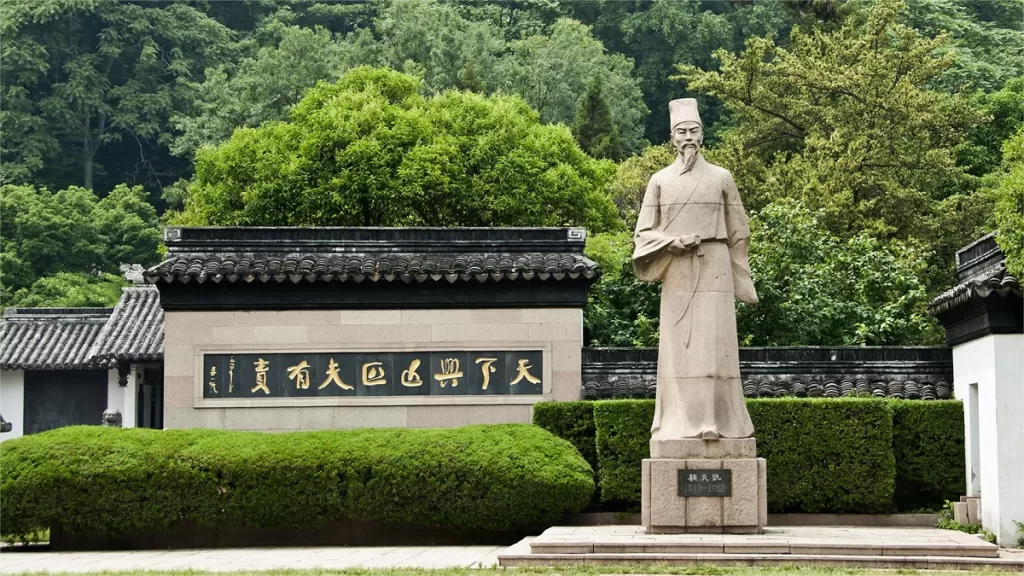Gu Yanwu (顾炎武), also known as Ku Yen-wu, was a prominent Chinese scholar, thinker, and writer during the Ming and early Qing dynasties (1613-1682). He is celebrated for his extensive contributions to various fields, including classical Chinese studies, historical criticism, and philosophy. Gu Yanwu’s enduring legacy lies in his commitment to reviving and preserving classical Chinese thought while challenging prevailing orthodoxies. In this 900-word introduction, we will explore the life, works, and intellectual significance of this remarkable figure.
Early Life and Background
Gu Yanwu was born in 1613 in the city of Kunshan, located in present-day Jiangsu Province, China. His early life was marked by intellectual curiosity, which was nurtured by the rich cultural milieu of the Ming Dynasty. During his formative years, China was experiencing significant political and social upheaval, with the decline of the Ming Dynasty and the rise of the Qing Dynasty. This period of turmoil deeply influenced Gu Yanwu’s worldview and intellectual pursuits.
Scholarly Contributions
Gu Yanwu made groundbreaking contributions to various fields of study:
- Classical Chinese Studies: Gu Yanwu is renowned for his work in the field of classical Chinese studies. He was a tireless advocate for the restoration of the classical Chinese language and the revival of ancient texts. His most famous work, the “Yinzhuan” (隐传), is a monumental commentary on the “Rites of Zhou” (周礼), a classic text from the Western Zhou period. Gu’s meticulous scholarship aimed to clarify and preserve the original meaning of classical Chinese writings, ensuring that they remained accessible to future generations.
- Historical Criticism: Gu Yanwu was a pioneer in historical criticism, challenging the prevailing historical narratives of his time. He emphasized the importance of empirical evidence and critical analysis in the study of history. His critical examination of historical records and texts, such as “Notes on Zheng’s Spring and Autumn Annals” (郑氏春秋传), paved the way for a more rigorous and evidence-based approach to historiography.
- Philosophy: Gu Yanwu was not only a historian and philologist but also a philosopher. He was deeply influenced by the Neo-Confucian tradition, particularly the thought of Wang Yangming. Gu’s philosophical writings explored topics such as the nature of knowledge, the cultivation of virtue, and the relationship between individual conscience and social duty. His philosophical works, such as “Rizhilu” (日知录), continue to be studied by scholars interested in Chinese philosophy.
Intellectual Significance
Gu Yanwu’s intellectual significance can be understood in several ways:
- Preservation of Chinese Culture: Gu’s dedication to the preservation and revitalization of classical Chinese culture was instrumental in safeguarding China’s literary and philosophical heritage. His meticulous work in annotating and interpreting classical texts ensured that the wisdom of the past would not be lost to future generations.
- Empirical and Critical Approach: Gu Yanwu’s emphasis on empirical evidence and critical analysis in historical and literary studies challenged prevailing dogmas and paved the way for a more rigorous and scientific approach to scholarship. His methods influenced later generations of scholars in China.
- Intellectual Independence: Gu Yanwu’s intellectual independence and willingness to question established orthodoxies made him a beacon of free thought in a society characterized by Confucian orthodoxy. He championed the idea that knowledge should be pursued for its own sake, free from the constraints of tradition.
- Influence on Modern China: Gu Yanwu’s ideas had a lasting impact on modern Chinese thought and scholarship. His call for a return to classical Chinese language and culture resonated with later reformers, contributing to the intellectual ferment of the late Qing Dynasty and the early 20th century. His work continues to be cited and studied in contemporary Chinese academia.
Legacy
Gu Yanwu’s legacy endures in contemporary China and beyond. His contributions to classical Chinese studies, historical criticism, and philosophy have left an indelible mark on the intellectual landscape. His writings continue to be studied and revered, and his ideas about the importance of preserving and critically examining cultural heritage remain relevant in an era of rapid change and globalization.
Conclusion
In conclusion, Gu Yanwu was a towering figure in Chinese intellectual history, known for his dedication to classical Chinese culture, his pioneering work in historical criticism, and his philosophical insights. His intellectual independence and commitment to the pursuit of knowledge continue to inspire scholars and thinkers in China and around the world. Gu Yanwu’s life and work exemplify the enduring power of ideas and the transformative potential of rigorous scholarship.

